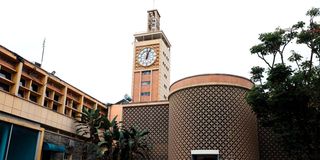MPs want Senate barred from law involving PSC

Parliament Buildings in Nairobi. The National Assembly questions why Senators should have been involved in the passage of the Parliamentary Service Bill.
The National Assembly wants the Supreme Court to bar Senate from participating in enactment of a law concerning functions and powers of the Parliamentary Service Commission (PSC).
In documents filed at the Apex court in a long running supremacy battle between the two Houses, MPs want the top judges to reverse a Court of Appeal’s decision declaring that Senators should have been involved in enactment of the Parliamentary Service Act, 2019.
Through lawyers Paul Muite and Mansur Issa, the MPs have petitioned the Supreme Court to find that Senators were lawfully excluded in the making of the Act because it does not concern county governments.
Among other things, the Act provides the manner of appointment of members of the PSC and procedure for the conduct of business and affairs of the Commission.
Also Read: One woman against the greed of MPs
It also provide for the execution of the functions of the PSC, the procedural functions of the Clerk of each House and administrative functions and powers of the said Clerks over the members of staff so as to safeguard the independence of each House.
In their filings at the Supreme Court, the National Assembly argues that the Court of Appeal erred in finding that the passage of the Parliamentary Service Bill without the input of the Senate was unconstitutional for want of the Senate’s consideration.
The National Assembly, through their lawyers, have questioned why the appellate court said Senators should have been involved, while at the same time ruled that provisions of Articles 109 to 114 of the Constitution did not provide a basis for the Senate to participate in the enactment of the said Act.
The above said Constitutional provisions relate to bills concerning the functions and powers of county governments.
Parliamentary Service Act concerns the administrative operations of the Houses of Parliament.
“Having made a finding that the provisions of Articles 109 to 114 of the Constitution did not provide a basis for the Senate to participate in the enactment of the Parliamentary Service Act as the said Constitutional provisions relate to bills concerning the functions and powers of counties rather than the administrative operations of the Houses of Parliament, the Court of Appeal erred in finding that the passage of the Parliamentary Service Bill without the input of the Senate was unconstitutional,” said Mr Muite, a senior counsel.
He added that the appellate court erred in expanding the legislative mandate of the Senate to cover a third category of bills, namely “bills concerning the Senate”.
According to Mr Muite, this is outside the two categories intended for consideration by the Senate under Articles 109 – 114 and Articles 218 of the Constitution, which talks of Special Bills and Ordinary Bills touching on the functions of counties.
“The Court of Appeal erred in failing to interrogate whether the Parliamentary Service Act as enacted was unconstitutional and failed in its jurisdiction to interpret and enforce the Constitution. The court adopted a narrow, restrictive and erroneous interpretation of the Constitution and as a result arrived at a wrong determination in law,” said Mr Muite.
He further faulted the appellate court for finding that the enactment of the Act was unconstitutional for want of the Senate’s consideration despite having made a finding that Article 127 of the Constitution was silent on the enactment of a bill of its nature.
The lawyers want the Supreme Court to allow National Assembly’s cross-appeal lodged alongside another one filed by the Senate challenging part of the same judgment by the court of appeal.
For their part, the Senate is challenging a declaration that not all Bills tabled at the National Assembly require to be referred to the Senate before been signed into law by the President.
The petition by the Senate is also against a finding that the Bills which should be subjected to joint resolution and mandatory concurrence process of both Speakers are only those concerning county governments.
The senators argued that the Court of Appeal judges erred in law and fact by failing to uphold the mandatory requirement in Article 110(3) of the Constitution.
“The said article of the Constitution requires that before either House considers a Bill, the Speaker of the National Assembly and the Senate should jointly resolve the question as to whether the Bill concerns counties, and if it is, whether it is a special or ordinary Bill," the senate said in the petition.
The case is pending hearing.





